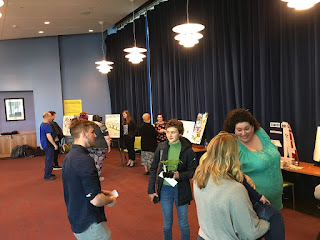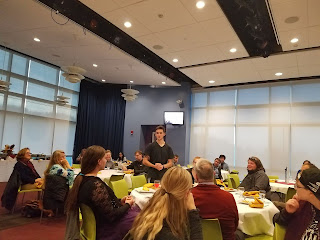The blog below was written by Brianna Smith ('19), who traveled with me to New Orleans for the National Collegiate Honors Council conference a week or so ago. While there, she presented with me on ways of encouraging students to talk in a seminar class, she moderated other presentations, and she attended many others. We saw some of the sights and talked a lot about Honors at FLCC. These are the thoughts she had after that event - and she will be coming to see us in the Spring 2020 semester to share what she learned and has experienced as an Honors Studies Scholar who has since transferred on to a four year school.

Nurse, doctor –
pediatrician, to be exact. An inkling
of something more, words on parchment, a secret fostered but never able to
fully manifest.
Writer, reader, uncertain fates, how do you take a hope and
make it into something tangible? Journalist? Journalist! But, no… The pull of a
well-worn cover calls, beckoning in the same manner of an open classroom door,
an opportunity to offer something more lasting than any physical gift, a chance
to educate, to open minds.
When you ask a child what they want to be, their dreams are
often outrageous, aspirational. Dreams, after all, don’t need to be about
reality, but about the deepest desires of the heart. I was the opposite, I
bound by practicality, by fear. Honors taught me to dream again. Before
crossing that threshold I had scorned those who chose majors of passion because
I did not understand what it was to have faith in oneself, to see the potential
in dreams. I had always loved to learn, but I didn’t understand how to learn
only because I loved it.
Honors taught me I could. More than that, it taught me
letting go could be safe, slowly weeding out the fears that had grown like
cancerous ivy, blocking out the light.

But then, as we all must I stepped back to continue my
education, knowing the transition would be difficult. I didn’t realize at the
time how much I would struggle. Honors had provided me not only with a
classroom, but a community. In the chaos of transferring and the adaptation it
demands, I had lost my vision. When I set foot in the first session at the
National Collegiate Honors Council Conference this November I wasn’t sure what
to expect not only of the conference, but of myself. I hadn’t realized how much
being back in an Honors-driven environment after certain constraints had caused
me to take a step back, would truly affect me.
It was like seeing the sun again. The doubt I had been
feeling, a common parasite in the education experience, was extracted. I had
forgotten for a time what education was truly about, and fell prey for a moment
to the dialogue that college is only here to provide students with
job-training. In slipping into this trap I had forgotten to remember how much I
loved learning. The spirit of inquiry had for a second faded as pressure to
perform and assert myself in a new environment grew.
One of the sessions for which I moderated at the conference focused
on how the university has become part of a capitalist machine, churning out
students for the world of adult employment. It was this trap which I had fell prey
to for a moment, and which students all around me lose themselves to. In
pushing for college education as a necessity for success (a patently false
narrative) we generate students who lack inspiration, who do not understand
what it is to love learning. Rather they seek the same pattern that we see more
and more in middle and high-schools: to find the right answer, to get the right
grade, to make it through. This dialogue that we’ve created around higher
education doesn’t empower the student to learn for the love of learning, but
teaches them how to run through motions, dulling the beautiful landscape of
education.

Honors is the solution. I think that often when students
hear the word
honors their mind bristles with fear and preconceived
notions. They worry Honors isn’t for them, that it is unobtainable, that the
students are high-achieving in a way that they never can be. But I’d like to
believe the opposite. Honors doesn’t just draw in high-achieving students, it
helps to create them. The Honors layout at FLCC is unique because it does not
require students to have a specific GPA when they enter into the program, but
only that they work towards an aspirational goal to receive their Honors
Designation. This goal is often so much more obtainable than students think.
But more than this, Honors provides students with a network of professors and
faculty who are in love with what they do. One of the comments I often heard
from professors in my years at Finger Lakes was that they were there to teach,
not to research, not to publish. To
teach. It’s funny how that can seem
like a novel idea when you step into higher education.
As students I think we get caught up in simply trying to
make it through in the quickest amount of time with the most success so that we
can get a job and hopefully one day earn a livable wage. This dialogue of college as a stepping stone
to success forgets that the university was once designed to foster learning
beyond its walls. Honors combats this amnesia because it sets out to create lifelong
learners, instilling the ever-important spirit of inquiry. Because it teaches
students that there is more to life than a right or wrong answer, that learning
for the pleasure of learning is beautiful. own several shirts now that bear one
significant reminder: stay curious. Because at FLCC that’s all you have
to be: curious. We don’t force students to distinguish themselves by arbitrary
measures of what they presume is their intelligence. Rather, the hallowed
spaces of our classrooms are open-air arboretums, temples with no locks, no
chains on the doors. Because learning has never, never been about a number on a
scale. Learning at its heart is about the insatiable drive of curiosity.

When academia wonders how we, members of a learning
community, combat the tidal wave of economically-driven students, I truly
believe that Honors and what it stands for is the answer. Engaging students by
creating a safe environment for them to ask questions not only of the material,
but of themselves, is the first step. This brings up a number of questions: how
do we make Honors accessible not only on our campus, but to all students across
the educational landscape? How do we appeal to students who might not know that
Honors is for everyone, not just a select few? I don’t have answers to these
questions, not yet. But what I do have is a belief, something I had forgotten
for a moment, but which is singing deep inside of my soul now with an sound
which cannot be silenced: Honors works. Honors matters. Honors is how we remind
students to learn. Not because it has a pretty title, not because it requires
success as a pre-requisite – it doesn’t. But because Honors believes in
students. Because it gives them a goal. Because it asks them to look inside of
themselves to find the answers.
We talk
a lot in Honors about the importance of reflection. Often times, the first
question students are asked is: why are you here? There is no right answer.
More importantly, there is no
wrong answer. And always, always there is
hope that Honors can remind students of something crucial: learning is for
everyone. And it is beautiful.

 In order to help support this event, we will be gathering on
the third floor of the library for Study-a-thon again this year. I’ll have poster board, crayons, markers,
pencils, colored pencils, and rulers. We
can make posters together and also take advantage of all the other amazing
things going on in the library that day.
In order to help support this event, we will be gathering on
the third floor of the library for Study-a-thon again this year. I’ll have poster board, crayons, markers,
pencils, colored pencils, and rulers. We
can make posters together and also take advantage of all the other amazing
things going on in the library that day.

























